
Background information
Overhype's new tactical title: where "Menace" convinces - and where it doesn't
by Kim Muntinga

A geography teacher has designed a bee social game. The aim is to highlight their pollination work for our biodiversity and raise awareness among children. Inventor Markus Lehmann has now launched a crowdfunding campaign to bring the game to market.
The timing couldn't be better: Even though the start of spring is still dragging on this year, bees will soon be back pollinating flowers, shrubs and trees by flying from plant to plant in search of nectar. The board game "Dance of the Bees" is dedicated to precisely this topic. It was designed by geography teacher Markus Lehmann from Oberwil (BL). "I started inventing and designing games during the pandemic." He has already sent some of them to game publishers, particularly in Germany. Without success.
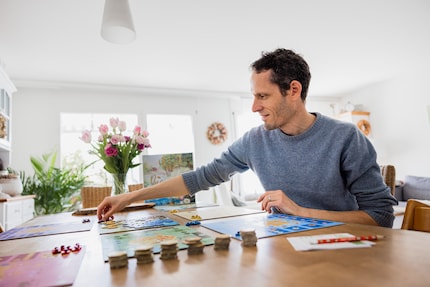
"If I received a response at all, it was usually that my game lacked a unique selling point or that the publisher was covered with game ideas for the next year or two." Lehmann suspects that the publishers receive so many concepts that only those games that have the potential to become "Game of the Year" are given a chance.
He had actually almost buried the plan to launch his own game on the market. Then one day he came across the topic of bees. "A good two years ago, I came across a picture book about bees during a visit to the library with my children and wondered whether there was already a themed board game on this topic. Because there are already a lot of bee games for small children," explains the 43-year-old. He likes to play games himself with his 10 and 12-year-old children that also teach them something. "A quick search showed that there was no such game on the market yet. I then decided to design a bee game."
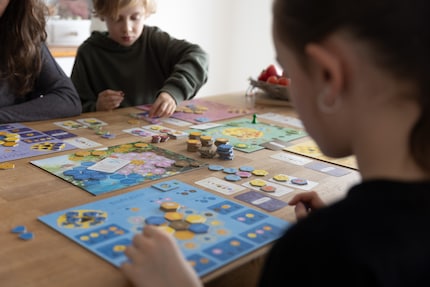
It took over two years from the idea to the finalisation of the game. "Unlike my previous games, I decided to bring it to market myself," says Lehmann, who lives with his family in Oberwil (BL). He made the cardboard prototype himself. The game was illustrated by Rozenn Grosjean, who has also designed other games.
The game is designed for two to four people and can be played from the age of around ten. The maker himself describes the luck factor as relatively "low". The idea is quickly summarised: You take over the management of a bee colony and try to use your workers wisely so that your people have enough food. "In addition, the bee colony should also grow, pollinate as many flowers as possible and store their nectar and pollen in the honeycombs," Lehmann continues.
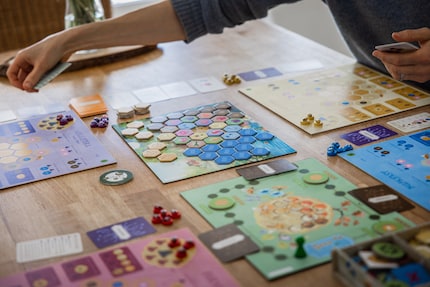
Without the pollination work of bees, there would hardly be any berries, fruit, vegetables and the diversity of flowers. "But there are also dangers lurking from voracious animals, so individual bees also have to be used as guards." Resin can be collected from the trees and stored as a defence against bacteria and fungi. "Now a race against time begins, because a bee year passes quickly and only those who have a large colony with enough stored honey will survive the coming winter," says Lehmann.
Whether his game will ever come onto the market now depends on whether Markus Lehmann can raise enough money to produce his game. At the beginning of May, he therefore launched a crowdfunding campaign on Wemakeit.com. "My goal is to raise at least 29,000 francs within a month." If he raises the money, he can have 1,500 copies made - the minimum order quantity, as Lehmann explains. "As is typical with crowdfunding, the supporters will receive a copy first."
The games are produced by the company Ludo Fact in Germany. "We are talking about climate-neutral and sustainable production without plastic," emphasises Lehmann. Cheaper production in China, for example, was out of the question for him.
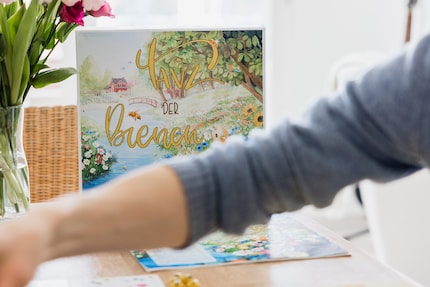
The Swisslos Fund (BL) has also already pledged support. There is also a cooperation with Diestadtgärtner.de. "This means that one square metre of bee-friendly meadow is sown for every game sold."
In order for Markus Lehmann to reach the crowdfunding amount, he has come up with some additional milestones. These are intended to enhance the game and also maximise the funding amount of the crowdfunding campaign so that he doesn't have to store a few hundred more games in the basement. Markus Lehmann clarifies what exactly is meant by milestones: "For example, as soon as a funding amount of 34,000 francs is exceeded, everyone gets the wooden bees for free, so to speak, or thicker cardboard or additional cards later on."
If not all of the 1,500 games produced go to the crowdfunding supporters, Markus Lehmann would like to try to sell the remaining games online or via web shops run by well-known organisations such as WWF, Greenpeace or ProNatura. "But that's just it: That's all in the future. For now, I just hope that I can raise the money I need for my first work."
Cover photo: Christian Walker
Half-Danish dad of two and third child of the family, mushroom picker, angler, dedicated public viewer and world champion of putting my foot in it.
Interesting facts about products, behind-the-scenes looks at manufacturers and deep-dives on interesting people.
Show all
Background information
by Kim Muntinga
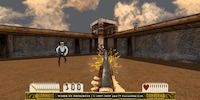
Background information
by Philipp Rüegg

Background information
by Philipp Rüegg